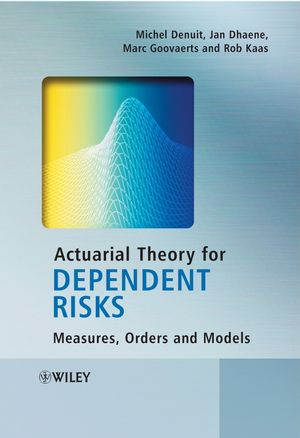Actuarial Theory for Dependent Risks: Measures, Orders and ModelsISBN: 978-0-470-01492-9
Hardcover
480 pages
November 2005
 This is a Print-on-Demand title. It will be printed specifically to fill your order. Please allow an additional 10-15 days delivery time. The book is not returnable.
|
||||||
The increasing complexity of insurance and reinsurance products has
seen a growing interest amongst actuaries in the modelling of
dependent risks. For efficient risk management, actuaries need to
be able to answer fundamental questions such as: Is the correlation
structure dangerous? And, if yes, to what extent? Therefore tools
to quantify, compare, and model the strength of dependence between
different risks are vital. Combining coverage of stochastic order
and risk measure theories with the basics of risk management and
stochastic dependence, this book provides an essential guide to
managing modern financial risk.
* Describes how to model risks in incomplete markets, emphasising insurance risks.
* Explains how to measure and compare the danger of risks, model their interactions, and measure the strength of their association.
* Examines the type of dependence induced by GLM-based credibility models, the bounds on functions of dependent risks, and probabilistic distances between actuarial models.
* Detailed presentation of risk measures, stochastic orderings, copula models, dependence concepts and dependence orderings.
* Includes numerous exercises allowing a cementing of the concepts by all levels of readers.
* Solutions to tasks as well as further examples and exercises can be found on a supporting website.
An invaluable reference for both academics and practitioners alike, Actuarial Theory for Dependent Risks will appeal to all those eager to master the up-to-date modelling tools for dependent risks. The inclusion of exercises and practical examples makes the book suitable for advanced courses on risk management in incomplete markets. Traders looking for practical advice on insurance markets will also find much of interest.
* Describes how to model risks in incomplete markets, emphasising insurance risks.
* Explains how to measure and compare the danger of risks, model their interactions, and measure the strength of their association.
* Examines the type of dependence induced by GLM-based credibility models, the bounds on functions of dependent risks, and probabilistic distances between actuarial models.
* Detailed presentation of risk measures, stochastic orderings, copula models, dependence concepts and dependence orderings.
* Includes numerous exercises allowing a cementing of the concepts by all levels of readers.
* Solutions to tasks as well as further examples and exercises can be found on a supporting website.
An invaluable reference for both academics and practitioners alike, Actuarial Theory for Dependent Risks will appeal to all those eager to master the up-to-date modelling tools for dependent risks. The inclusion of exercises and practical examples makes the book suitable for advanced courses on risk management in incomplete markets. Traders looking for practical advice on insurance markets will also find much of interest.



